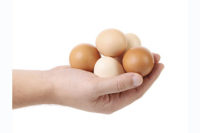Farm to plate
Choosing humane certification




The sharp rise in Chipotle’s growth is often attributed to the company’s marketing of “Food with Integrity” — in particular, its animal-welfare standards. Chipotle’s standards, however, also come at a cost. When a pork supplier pulled out of the program earlier this year, the restaurant had to stop serving carnitas at one-third of its locations.
There’s a better way to tap into consumers’ desire for humane treatment of food animals without sacrificing availability or affordability.
Consumers care about how food animals are raised. In a survey conducted by the American Humane Association last year, 93 percent of nearly 6,000 respondents said buying products from humanely raised animals is very important to them. More than three-quarters of respondents said they would be willing to pay more for humanely raised meat, eggs and dairy products.
In recent years, several humane certification programs have emerged to deal with this demand. The upside of having third-party certification of your supply chain is obvious. A humane certification label assures consumers that farmers and producers across the U.S. are raising these animals under good animal-welfare standards, covering everything from adequate space to air quality, diet, living conditions and the ability to express natural behaviors.
Less obvious is which certification program to use. Some producers promote internal standards, which are not verified through an audit process. Other programs are only available for very small farms. My organization, American Humane Association, runs the longest-standing farm animal welfare program, American Humane Certified. Currently, we certify well over 1 billion animals in the United States, representing one in eight farm animals.
No other certification program comes close in size to ours.
Our vision is that farmers can provide affordable, humanely certified food for all Americans. We don’t view humanely raised food as an elite commodity. It should be accessible to all Americans. It should be the standard by which all animals are raised, regardless of the size of the farm.
Our scientific standards cover space, light, air, food and water, and are based on the internationally accepted Five Freedoms. When these standards are met, consumers can feel confident animals are living a demonstrably humane life, and that farmers are indeed doing the right thing.
A good certification program must be based in science, and the science must inform good policy.
We don’t believe pressure is a progressive tool. Our program is about collaboration, not contentiousness. Farmers are and have always been the first-line stewards of animal welfare, and American Humane Association has a long history — going back to 1877 — of working positively with farmers and ranchers to ensure best practices. America has a safe, affordable food supply thanks to the hard work of producers, and now your customers are asking to be assured it is humane as well.
The 2014 survey we conducted showing overwhelming consumer demand — and willingness to pay more — for humanely raised meat, eggs and dairy products also found products labeled “humanely raised” ranked higher in consumers’ expressed perceptions of importance than those labeled “antibiotic-free,” “organic” or “natural.”
Interestingly, however, more than half of respondents (55 percent) reported products branded humanely raised were either not available (36 percent) or too expensive (19 percent).
There’s no reason humanely raised food should be too expensive or unavailable to Americans. There’s clearly consumer demand for humanely raised products — and an opportunity for processors, producers and retailers to fill it.
What are we waiting for?
Looking for a reprint of this article?
From high-res PDFs to custom plaques, order your copy today!









